Kathleen Jones's Blog, page 70
April 10, 2012
Poetry Reading in London
 More trains and planes! My carbon footprint must be quite embarrassing. I won't be on the internet for a few days now - leaving very early tomorrow to catch a flight to London for a poetry reading. Staying overnight with youngest daughter (and the cute Isabella) and then back to Cumbria for a blast of northern weather. Back online on Friday.
More trains and planes! My carbon footprint must be quite embarrassing. I won't be on the internet for a few days now - leaving very early tomorrow to catch a flight to London for a poetry reading. Staying overnight with youngest daughter (and the cute Isabella) and then back to Cumbria for a blast of northern weather. Back online on Friday.If anyone's around in London and at a loose end on Wed 11th, I'm reading with Michael Woods (5th collection 'Chora') at The Green Pub, Clerkenwell Green, 7.30pm and it's a free gig courtesy of our publishers, Templar Poetry.
Now I'm off to throw random items into a suitcase. Wish me luck!![image error]
Published on April 10, 2012 14:36
April 7, 2012
A week in Poetry
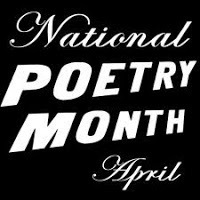
Being a writer, and particularly a poet, can sometimes seem just a long endurance course of rejection. The world of prose publishing is particularly bruising at the moment, but on the poetry front some very nice things have been happening for a change.
At the beginning of the week Abegail Morley featured 'Not Saying Goodbye at Gate 21' on her wonderful poetry site (which includes lists of magazines as well as poets) and has promised to review the collection at the beginning of May. This came just after Michelle McGrane had featured 6 poems from the collection on Peony Moon . Check both sites out for some fantastic international poetry. And both Abegail (published by Cinnamon and Pindrop)
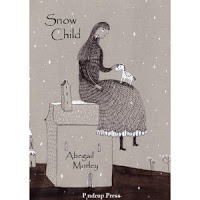
and Michelle published by Salt) are very fine poets in their own right.
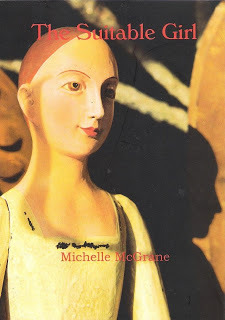
Then, yesterday, I opened the Poetry Kit newsletter to discover that the collection and my website were featured on Poetry Kit . (click on Poetry Kit Awards 2012)

If you haven't found this site yet, it's a mine of information for poetry events and publications all over the world. It takes a bit of time to work out how to navigate through all the windows, but there's some really good information there and the newsletter is excellent.
Then, just to put the chocolate flake in the ice cream, Two Ravens Press accepted 3(!!) of my poems for their new Earthlines Anthology of Eco Poetry. I've very pleased about this, because they're poems from the new sequence of poems based on the mythology and literature of the Haida Gwaii islands. I'm probably challenging fate by telling you before they've actually appeared, but I'm really excited!

If you haven't found Two Ravens Press yet, they publish some top quality books - fiction, poetry and 'eco-literature'. Murmurations, an anthology of short fiction edited by Nicholas Royle, has been getting some fantastic reviews in the 'Heavies', also featured on BBC Radio 4, and Alice Thomson's Existential Detective was the Sunday Telegraph book of the year.
Haven't heard anything about my prose submissions yet, but one just has to hope that 'no news is good news' in the current climate! Fingers well and truly crossed. It's just as well there's an up as well as a down.
I'm reading with Michael Woods at The Green Pub, Clerkenwell Green, London, on Wed. 11th April, at 7.30pm. Free Entry. Templar Poetry.
Published on April 07, 2012 04:05
April 4, 2012
E-Authors Beware - Internet Trolls and Spam Reviews!!!
I'm blogging over at
Authors Electric today
, on one of the hazards of E-publishing - the problem of Internet Trolls and Spam Reviews.
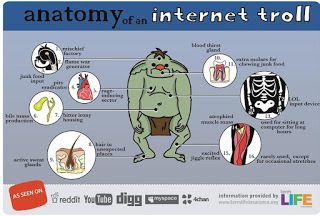
"Getting your book reviewed is one of the most difficult aspects of publishing a book - whether you're doing it yourself or through a publishing house. We're all eager to have our books noticed and recommended to the lovely readers we hope to entertain, inform or intrigue. Magazine and newspaper review sections have contracted over the past few years, so sources of hard-copy review are hard to find and usually closed to independently published books. But, at the same time, Cyber-reviewing has expanded into outer space and beyond........ " Read More ........


"Getting your book reviewed is one of the most difficult aspects of publishing a book - whether you're doing it yourself or through a publishing house. We're all eager to have our books noticed and recommended to the lovely readers we hope to entertain, inform or intrigue. Magazine and newspaper review sections have contracted over the past few years, so sources of hard-copy review are hard to find and usually closed to independently published books. But, at the same time, Cyber-reviewing has expanded into outer space and beyond........ " Read More ........
Published on April 04, 2012 18:39
April 2, 2012
Tuesday Poem: Scorpion
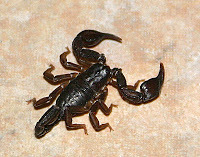
Scorpion
A question mark on the floor
in shadow beside the shoe rack.
Black patent claws
crabwise across the tiles.
I could kill it easily with
one petty crunch of my heel
this gleaming survivor
of a million holocausts -
the weaponry cocked
over its armoured carapace,
like a rocket-launcher.
I will tap my shoes carefully
every morning. Not walk
barefoot in the dark.
© Kathleen Jones
This is my first scorpion in Italy, glimpsed a few days ago. It was sneaking along the wall from the kitchen to the sitting room and about to scuttle under the sofa. We managed to get a photograph (though not one of the question mark sting curled over its back) before I gently swept it up and put it safely outside. They have a nasty sting, but aren't life-threatening here. Who am I to deal death to something that's lived on the planet for over 400 million years and will probably be here for another 400,000,000 after I've gone!
The Tuesday Poets are celebrating their 2nd anniversary in Cyber-Space by writing another 'group' poem. Each member of the group will be adding a couple of lines every few hours for the next couple of weeks. If you're interested in seeing how a poem can grow please have a look at the Hub at http://www.tuesdaypoem.blogspot.com
Published on April 02, 2012 18:18
April 1, 2012
Over the mountains to Reggio Emilia
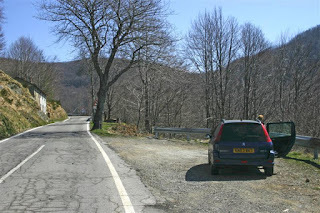
A quick visit yesterday to northern Italy, the town of Reggio Emilia in the Emilia Romagna region. We chose to drive there over the mountains - the double ranges of the Alpi Apuane and the Appenines, winding our way through steep valleys and over tortuous passes. There was snow still lying under trees on the higher slopes, but the alpine meadows were ablaze with spring flowers and cherry blossom.
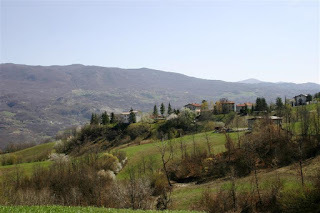
It took us about 5 hours to drive 100 miles, but it was worth it to see some of the most isolated upland villages and the views (despite hazy cloud) were spectacular, though difficult to photograph because of the haze.
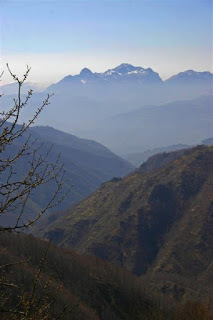
We went through the small medieval town of Castiglione di Gafagnana, where the fortifications still stand and there are 12th century churches and buildings everywhere.
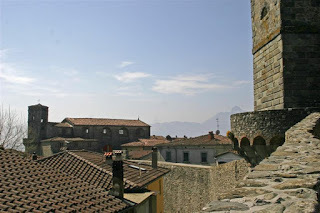
Emilia Romagna is one of the most wealthy region of Italy - fertile plains and a lot of manufacturing. Quite different to Tuscany. The town of Reggio Emilia is fairly modern by Italian standards - wide streets and imposing 18th and 19th century buildings - but lovely soft colours and it has a friendly, laid back feel to it.
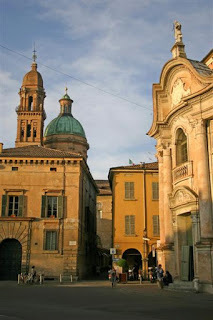
We lazed in the piazza over a coffee and indulged in a bit of 'people watching' which seems to be a favourite Italian pastime.
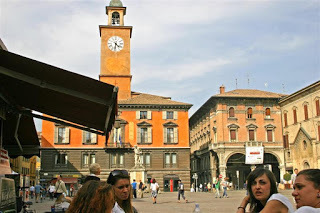
We were there for the exhibition opening of one of the Pietrasanta artists - Norwegian painter Dora Bendixon.
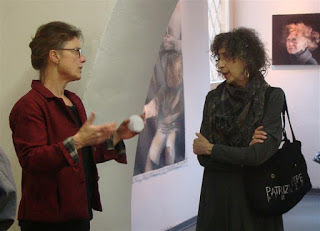
The show's called 'Hombres' and contains portraits and drawings of a family group as they interact with each other in the way that families do.
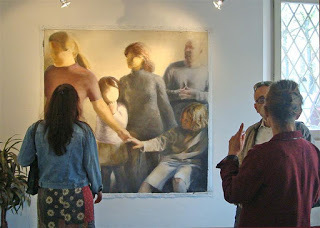
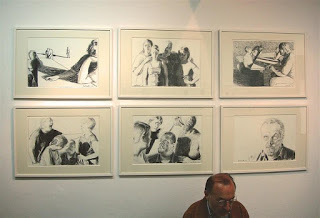
She uses light and shade to reveal the psychodynamics of the family, and when she uses colour, it's very rich. Dora is a wonderful portrait painter - she brings her subjects alive on canvas.
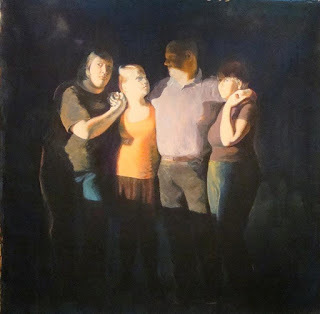
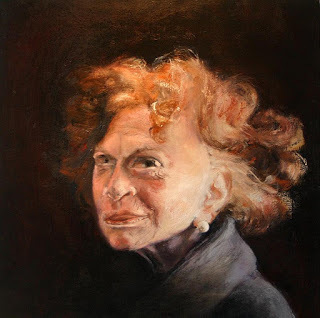
After the show, a late dinner at a backstreet restaurant that served local, rather than tourist, food and a much quicker (2 hour) drive back on the autostrada. The car, fortunately, didn't turn into a pumpkin on the motorway and we were home and in bed before 2am. And not a moment too soon, if this sneaky snap taken by the Pri-mate is to be believed. A fabulous day!
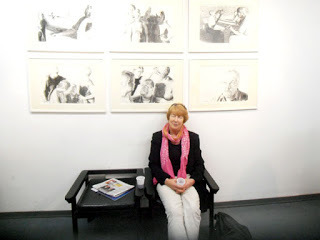
Published on April 01, 2012 06:04
March 29, 2012
Adrienne Rich: 1929 - 2012

Adrienne Rich died last night at the age of 82. Her importance to the feminist movement can't be underestimated. There was a time when almost everyone I knew had a copy of her prose essays; 'Lies, Secrets and Silence'. Her poetry has been life-changing for many women, because she put into words what had not been said before - about the reality of women's lives.
I haven't agreed with all Adrienne Rich's politics - I like men, love men, and often think they've had as raw a deal as we have from gender stereotyping, but that wasn't something you could say in the heat of the feminist debate. Nevertheless, her poetry has been very important in my own life. 'Snapshots of a Daughter in Law' hit me like a blinding flash when it was published in England, and gave words to my severe depression caused by trying to live in an unhappy relationship. Like the young woman in her poem, I too would stand at the kitchen sink, blinded by misery.
Banging the coffee-pot into the sink
she hears the angels chiding, and looks out
past the raked gardens to the sloppy sky.
Only a week since They said: Have no patience.
The next time it was: Be insatiable.
Then: Save yourself; others you cannot save.
Sometimes she's let the tapstream scald her arm,
a match burn to her thumbnail,
or held her hand above the kettle's snout
right in the woolly steam. They are probably angels,
since nothing hurts her anymore, except
each morning's grit blowing into her eyes.
Here was someone who felt just like me - whose mind wandered towards poetry and other things while doing the washing up, who kept trying to be the perfect wife, crushing down rebellion and dissatisfaction at the limitations of the role. Suddenly, instead of feeling guilty about those snatched moments scribbling, I felt validated. It was ok to write and let the dust gather on the piano! Later I found 'Diving into the Wreck'
and loved it - the exploration of that undersea, unfathomable landscape inside us. It's not just a feminist poem, it's universal. This is just a short quote.
I came to explore the wreck.
The words are purposes.
The words are maps.
I came to see the damage that was done
and the treasures that prevail.
I stroke the beam of my lamp
slowly along the flank
of something more permanent
than fish or weed
the thing I came for:
the wreck and not the story of the wreck
the thing itself and not the myth
the drowned face always staring
toward the sun
the evidence of damage
worn by salt and sway into this threadbare beauty
the ribs of the disaster
curving their assertion
among the tentative haunters.
But the one that always makes me smile is the one about living with an artist, called 'Living in Sin', and the romantic disillusionment that sets in from the first moment: -
She had thought the studio would keep itself;
no dust upon the furniture of love.
Half heresy, to wish the taps less vocal,
the panes relieved of grime.
But of course, given the extent of her expectations, reality soon begins to creep in.
By evening she was back in love again,
though not so wholly but throughout the night
she woke sometimes to feel the daylight coming
like a relentless milkman up the stairs.
I live with an artist and there's a lot of dust on the furniture (not to mention the windows) - but I cancelled the milkman a long time ago!
Published on March 29, 2012 10:37
March 26, 2012
Tuesday Poem: Suitable Poetry from Fry and Laurie
I thought it was time for some light relief. This small video by Hugh Laurie and Stephen Fry features 'suitable poetry' for the time-challenged modern traveller. If the video doesn't run for you, please follow this link.
http://youtu.be/0nTmSu6v0LA
For more contributions from the Tuesday Poets please visit the Tuesday Poem hub at http://www.tuesdaypoem.blogspot.com

http://youtu.be/0nTmSu6v0LA
For more contributions from the Tuesday Poets please visit the Tuesday Poem hub at http://www.tuesdaypoem.blogspot.com
Published on March 26, 2012 14:07
March 23, 2012
The Lost Village
The spring weather has been lovely here - sunshine and clear skies, but still cool enough to walk up into the mountains.
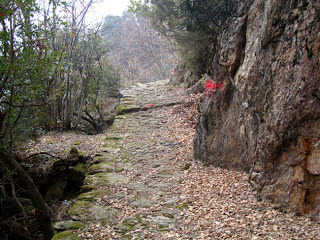
We went off to explore some of the ancient 'Pilgrim Paths' in the Alpi Apuane - this one starting on the hill just above our little house. I'm not sure why they call them Pilgrim paths because they seem to have been constructed to connect the little hamlets on the mountainside with each other and with the towns on the coastal plain. Some of them were also used by workers in the marble quarries - many of whom walked for two hours to get to work and then two back. They're beautifully constructed with paved edges and cobbled centres, navigating precipitous slopes.
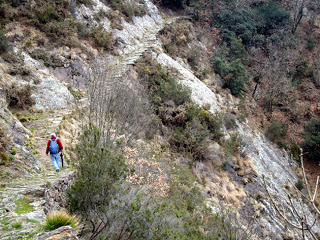
In the spring weather, the stones were dotted with wild crocuses and narcissi growing up through the cracks.
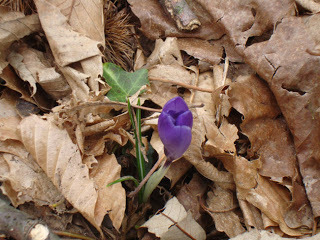
Most of the paths are very well marked, with red dots, as alpine routes - but somehow, in the chestnut forest, we took a wrong turning and found ourselves in a thicket of bamboo. It was only then that we realised that we were in the centre of a ruined village. We should have noticed the clumps of daffodils - remnants of someone's garden, and the beautiful stone walls - all that's left of the terraces they cultivated.
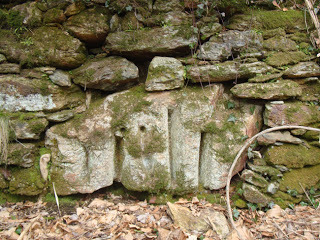
The houses had almost completely vanished. This photograph was taken from about 15 feet away from one of them and, although it's straight in front, you can hardly see it at all.
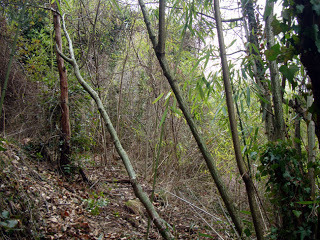
Down crumbling steps we found what had once been the village piazza. Under a chestnut tree that had taken root in the wall was a water cistern fed by a spring, and a carved trough for washing people and laundry.
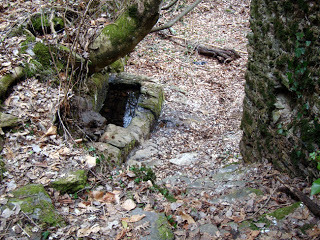
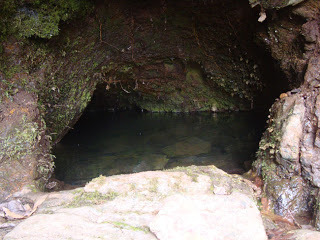
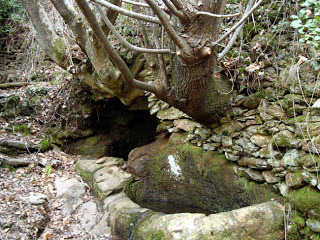
As we looked we began to see more and more houses hidden under the cover of wild clematis and bramble.
Doors swung open on scenes of desolation.
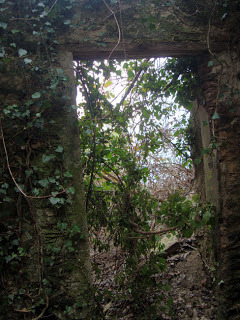
The front walls of some houses had collapsed into the valley. From one window I could see the mountains through the remains of what had once been three houses.
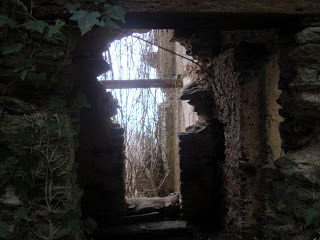
We found our way back to the path (it was so obvious we must have been talking or looking at the view in order to miss it!) and soon began to notice more ruins among the trees. This was our favourite - glorious views and much of it still standing. I sat on the front step and fantasised about living there.
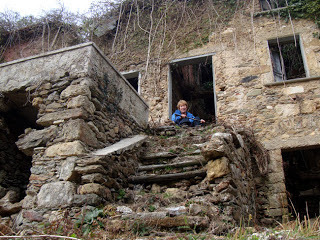
The sad thing is that the path we were on leads to Sant' Anna - location of one of the worst massacres in Italy during WWII. These villages too would have been searched and 'cleansed' by troops looking for partisans. That's one reason they're deserted. The other is that living up here is hard - people want electricity, running water, roads.
Two more beautiful things I found in the woods - a magical tree bole like a sculpture and some red, red moss on a silver rock.
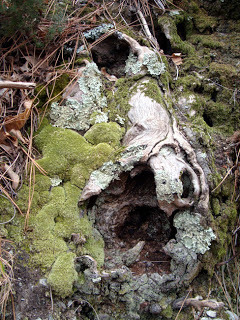
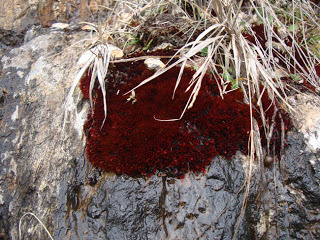


We went off to explore some of the ancient 'Pilgrim Paths' in the Alpi Apuane - this one starting on the hill just above our little house. I'm not sure why they call them Pilgrim paths because they seem to have been constructed to connect the little hamlets on the mountainside with each other and with the towns on the coastal plain. Some of them were also used by workers in the marble quarries - many of whom walked for two hours to get to work and then two back. They're beautifully constructed with paved edges and cobbled centres, navigating precipitous slopes.

In the spring weather, the stones were dotted with wild crocuses and narcissi growing up through the cracks.

Most of the paths are very well marked, with red dots, as alpine routes - but somehow, in the chestnut forest, we took a wrong turning and found ourselves in a thicket of bamboo. It was only then that we realised that we were in the centre of a ruined village. We should have noticed the clumps of daffodils - remnants of someone's garden, and the beautiful stone walls - all that's left of the terraces they cultivated.

The houses had almost completely vanished. This photograph was taken from about 15 feet away from one of them and, although it's straight in front, you can hardly see it at all.

Down crumbling steps we found what had once been the village piazza. Under a chestnut tree that had taken root in the wall was a water cistern fed by a spring, and a carved trough for washing people and laundry.



As we looked we began to see more and more houses hidden under the cover of wild clematis and bramble.
Doors swung open on scenes of desolation.

The front walls of some houses had collapsed into the valley. From one window I could see the mountains through the remains of what had once been three houses.

We found our way back to the path (it was so obvious we must have been talking or looking at the view in order to miss it!) and soon began to notice more ruins among the trees. This was our favourite - glorious views and much of it still standing. I sat on the front step and fantasised about living there.

The sad thing is that the path we were on leads to Sant' Anna - location of one of the worst massacres in Italy during WWII. These villages too would have been searched and 'cleansed' by troops looking for partisans. That's one reason they're deserted. The other is that living up here is hard - people want electricity, running water, roads.
Two more beautiful things I found in the woods - a magical tree bole like a sculpture and some red, red moss on a silver rock.


Published on March 23, 2012 14:14
March 20, 2012
Tuesday Poem: Poetry in Translation - Tomas Transtromer
April and Silence
Spring lies desolate.
This velvet-dark ditch
crawls by my side
without reflections.
The only thing that shines
is yellow flowers.
I am carried in my shadow
like a violin
in its black case.
The only thing I want to say
glitters out of reach
like the silver
in a pawnbroker's.
April Och Tystnad
Våren ligger öde.
Det sammtesmörka diket
krälar vid min sida
utan spegelbilder.
Det enda som lyser
är gula blommor.
Jag bärs i min skugga
som en fiol
i sin svarta låda.
Det enda jag vill säga
glimmar utom räckhåll
som silvret
hos pantlånaren.
Aprile e Silenzio
La primavera giace deserta.
Il fossato di velluto scuro
serpeggia al mio fianco
senza riflessi.
L'unica cosa che splende
sono fiori gialli.
Son trasportato dentro la mia ombra
come un violino
nella sua custodia nera.
L'unica cosa che voglio dire
scintilla irraggiungibile
come l'argento
al banco dei pegni.
I have the Bloodaxe 'Collected Poems' of Tomas Transtromer in English, but - because I'm learning the language, I also have his 'Sad Gondola' collection (La Lugubre Gondola) in Italian, and this edition includes the original poems in Swedish. So, by a happy accident, I'm able to read three different versions of the same poems - in three different languages - and I thought it might be fun to compare them. Looking at poems in translation can sometimes give additional insights into the meaning, but it always raises the questions, 'what is a good translation?' and 'is a translation a new poem altogether?'
Transtromer himself has written that 'theoretically we can, to some extent justly, look at poetry translation as an absurdity. But in practice we must believe in poetry translation.' He goes on to explain what he means by this, that there are two ways of looking at a poem. 'You can perceive a poem as an expression of the life of the language itself, something organically grown out of the very language in which it is written. ... impossible to carry over into another language.' But you can also believe that 'the poem as it is presented is a manifestation of another, invisible poem, written in a language behind the common languages. Thus, even the original version is a translation.' The Italian translator of his poems goes further and adds that every reader makes their own translation - for each one 'the text is the same, but the poetry is different.' So, no poem, in whatever language, is ever the same for every person. The important thing, she writes, is what happens between the text and the reader.
The English versions, by Robin Fulton, are excellent and come from a close partnership with the poet. George Szirtes writes in Poetry London that, 'Transtromer has entered the English language as if he had been born to it, floating in Anglo-American space with an ease denied to many other'. In Italy Transtromer is translated by Gianna Chiesa Isnardi and the poems are very, very close to the English (I can't judge on the Swedish). Essential features of the poem's structure have been kept, such as the repetitions in stanza two and four 'L'unica cosa', 'Det enda', 'The only thing'. The length of the lines remains more or less the same and most of the words are simple equivalents. 'Som en fiol', 'come un violino', 'like a violin'.
April and Silence translates very well - a straight-forward transmission of meaning using the repetitions of ideas and phrases, exactly chosen words. But the sounds and rhythms are very different. Looking at the unfamiliar symbols of the original Swedish I'd assumed that it would have a rougher sound than the Italian or English, but a Swedish friend here read it for me and I was surprised at the lyrical quality of the language. Smooth, musical and beautiful, more equivalent to the Italian than the English. I hadn't expected it to sound like that. This is a glimpse of Transtromer reading in Swedish.
For More Tuesday Poems please visit the Tuesday Poets hub at http://www.tuesdaypoem.blogspot.com
I'm having fun getting about a bit this week - also guest-blogging about 'The Itinerant Muse' over at Wendy Robertson's brilliant blog A Life Twice Tasted
and writing about women's diaries and letters 'What Survives of Us....' on Michelle McGrane's wonderful Peony Moon.

Spring lies desolate.
This velvet-dark ditch
crawls by my side
without reflections.
The only thing that shines
is yellow flowers.
I am carried in my shadow
like a violin
in its black case.
The only thing I want to say
glitters out of reach
like the silver
in a pawnbroker's.
April Och Tystnad
Våren ligger öde.
Det sammtesmörka diket
krälar vid min sida
utan spegelbilder.
Det enda som lyser
är gula blommor.
Jag bärs i min skugga
som en fiol
i sin svarta låda.
Det enda jag vill säga
glimmar utom räckhåll
som silvret
hos pantlånaren.
Aprile e Silenzio
La primavera giace deserta.
Il fossato di velluto scuro
serpeggia al mio fianco
senza riflessi.
L'unica cosa che splende
sono fiori gialli.
Son trasportato dentro la mia ombra
come un violino
nella sua custodia nera.
L'unica cosa che voglio dire
scintilla irraggiungibile
come l'argento
al banco dei pegni.
I have the Bloodaxe 'Collected Poems' of Tomas Transtromer in English, but - because I'm learning the language, I also have his 'Sad Gondola' collection (La Lugubre Gondola) in Italian, and this edition includes the original poems in Swedish. So, by a happy accident, I'm able to read three different versions of the same poems - in three different languages - and I thought it might be fun to compare them. Looking at poems in translation can sometimes give additional insights into the meaning, but it always raises the questions, 'what is a good translation?' and 'is a translation a new poem altogether?'
Transtromer himself has written that 'theoretically we can, to some extent justly, look at poetry translation as an absurdity. But in practice we must believe in poetry translation.' He goes on to explain what he means by this, that there are two ways of looking at a poem. 'You can perceive a poem as an expression of the life of the language itself, something organically grown out of the very language in which it is written. ... impossible to carry over into another language.' But you can also believe that 'the poem as it is presented is a manifestation of another, invisible poem, written in a language behind the common languages. Thus, even the original version is a translation.' The Italian translator of his poems goes further and adds that every reader makes their own translation - for each one 'the text is the same, but the poetry is different.' So, no poem, in whatever language, is ever the same for every person. The important thing, she writes, is what happens between the text and the reader.
The English versions, by Robin Fulton, are excellent and come from a close partnership with the poet. George Szirtes writes in Poetry London that, 'Transtromer has entered the English language as if he had been born to it, floating in Anglo-American space with an ease denied to many other'. In Italy Transtromer is translated by Gianna Chiesa Isnardi and the poems are very, very close to the English (I can't judge on the Swedish). Essential features of the poem's structure have been kept, such as the repetitions in stanza two and four 'L'unica cosa', 'Det enda', 'The only thing'. The length of the lines remains more or less the same and most of the words are simple equivalents. 'Som en fiol', 'come un violino', 'like a violin'.
April and Silence translates very well - a straight-forward transmission of meaning using the repetitions of ideas and phrases, exactly chosen words. But the sounds and rhythms are very different. Looking at the unfamiliar symbols of the original Swedish I'd assumed that it would have a rougher sound than the Italian or English, but a Swedish friend here read it for me and I was surprised at the lyrical quality of the language. Smooth, musical and beautiful, more equivalent to the Italian than the English. I hadn't expected it to sound like that. This is a glimpse of Transtromer reading in Swedish.
For More Tuesday Poems please visit the Tuesday Poets hub at http://www.tuesdaypoem.blogspot.com
I'm having fun getting about a bit this week - also guest-blogging about 'The Itinerant Muse' over at Wendy Robertson's brilliant blog A Life Twice Tasted
and writing about women's diaries and letters 'What Survives of Us....' on Michelle McGrane's wonderful Peony Moon.
Published on March 20, 2012 01:54
March 18, 2012
Mother's Day and Julia Copus' Ghost Lines

I'm a bit ambivalent about having 'days' for particular people or things. But 'Mother's Day' has such a long history - back to the Virgin Mary, and before that to the pagan mother goddesses we worshipped millenia ago. Even nature, the earth, was seen as a woman. Maybe to do with the mysterious processes of giving birth - it seemed such a miracle, and women risked their own lives in the process of giving life to a new human being. It also seems an appropriate day to remember those who long to have a child, yet can't. There's a moving series of poems by Julia Copus about the gruelling process of IVF, and its failure, called Ghost Lines, which was broadcast on BBC Radio 3 in December 2011 . Although the programme doesn't seem to be available for re-viewing at the moment, there's a trailer clip from the Fiction Factory . Ghost Lines is short-listed for the prestigious Ted Hughes prize for new work in poetry and is also in the current issue of Poetry London.
I particularly loved 'Inkling' which begins
Last night I sensed a taking root
under the bonecage of my heart,
a stirring, shifting; something not
quite of a breath or heartbeat's weight.
It was the inkling of a soul.
Now I shall have no peace at all
till he's caught and fastened, nested in
the cradle of my pelvic bone......
These poems are very, very special and I'm looking forward to reading them again in her next collection The World's Two Smallest Humans, due from Faber in July 2012.
Also remembering my own lovely mother today. I'm grown up enough to stand on my own two feet now, with grown up daughters of my own, but I still miss her. This photo is of her as a girl and I'm amazed how Italian she looks! - all those maternal relatives in Genoa, whose names I would love to know.
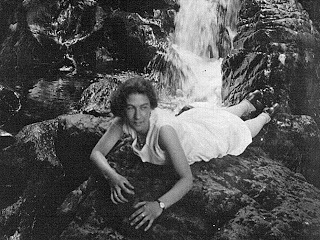
Published on March 18, 2012 03:44



